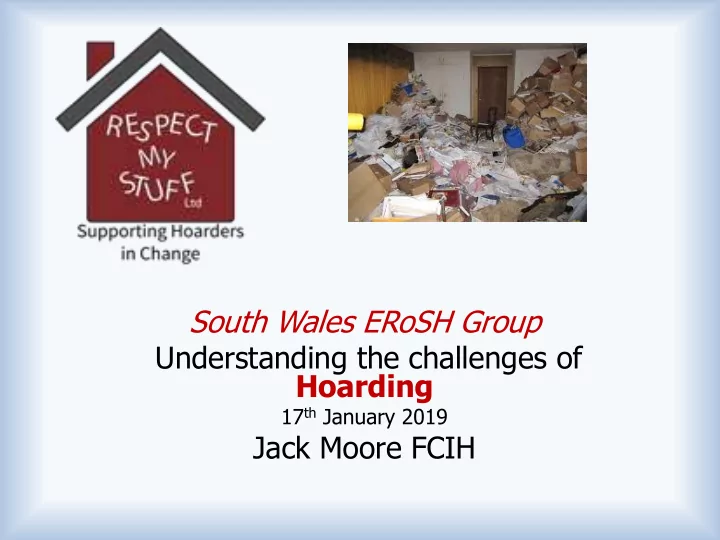

South Wales ERoSH Group Understanding the challenges of Hoarding 17 th January 2019 Jack Moore FCIH
Risk factors – Increased risk of… Fire ❑ Accumulation of combustible materials such as newspapers, clothing and rubbish Structural Damage ❑ Structural damage threatens the occupants, public safety personnel and adjacent buildings Disease, Injury and Infestation ❑ Storage of hoarded items makes cleaning nearly impossible, which can lead to unsanitary living conditions and increases the risk of disease
Clutter Image rating (see handout)
Equality Act 2010 definition of disability ➢ physical or mental impairment, and ➢ the impairment has a substantial and long-term adverse effect on ability to carry out normal day-to-day activities DUTY (FAILURE) TO MAKE REASONABLE ADJUSTMENTS (This and failure to demonstrate meeting Public Sector Equality Duty – tripping housing providers up in court)
Common diagnoses of mental health disorders, learning difficulties, developmental conditions and autistic spectrum disorders ❑ Depression ❑ ADD/ADHD ❑ Dyscalculia ❑ Anxiety ❑ Dyslexia ❑ Obsessive-compulsive ❑ Dyspraxia disorder ❑ Tourette’s Syndrome ❑ Hoarding disorder ❑ High Functioning Autism ❑ Phobias ❑ Asperger’s Syndrome ❑ Psychosis ❑ Bipolar disorder ❑ Schizophrenia ❑ Personality disorders ❑ Eating disorders ❑ Dementia
So is it a Hoarding Disorder or due to some other reason? A hoarding disorder is where someone acquires an excessive number of items and stores them in a chaotic manner. The items can be of little or no monetary value and usually result in unmanageable amounts of clutter. ❑ In May 2013 Hoarding Disorder was officially recognised in the DSM-V (the fifth edition of the Diagnostic & Statistical Manual of Mental Disorders). ❑ Version 11 (2018) of the International Classification of Diseases recognises Hoarding Disorder – World Health Organisation
The five diagnostic criteria used to identify a case of hoarding disorder 1. Persistent difficulty discarding or parting with possessions, regardless of their monetary value 2. This difficulty is due to a perceived need to save the items and distress associated with discarding them 3. The difficulty discarding possessions results in the accumulation of possessions that congest and clutter active living areas 4. The hoarding causes clinically significant distress or impairment in social, occupational, or other important areas of functioning 5. The hoarding is not attributable to another medical condition or mental disorder
Hoarding can also result from other problems ❑ Physical illness – can lead to tiredness and disorganisation. ❑ Dementia – memory problems can interfere with someone’s ability to organise themselves and their belongings. ❑ Depression – can make you lose interest in your normal activities, make it hard to concentrate and make it hard to make decisions. ❑ Alcohol and drug misuse – can affect your ability to look after yourself. ❑ Schizophrenia – unusual beliefs and a lack of organisation can lead to hoarding. ❑ Bipolar disorder – can make you shop too much (highs), and will interfere with your organisation (lows). ❑ Learning disability or acquired brain injury – can lead to problems with thinking and memory.
Hoarding can also result from other problems (cont’d) ❑ Autism and related disorders – collecting things can be a source of comfort. (clear communication / step by step actions / bite-sized interventions) ❑ Obsessive Compulsive Disorder (OCD) – you don't feel attached to your hoarded items, but you do fear what will happen if you throw them away, or fear of contamination results in inability to tackle post or throw rotton food away. About 1 in 20 people with OCD have a problem with hoarding. (NB Other research 20-30%) (Royal College of Psychiatrists) ❑ Attention defecit (and hyperactive) disorder – trouble staying focused on one task, flit from one area of interest to another ❑ PTSD or Victim of Crime – creates barrier or buffer against further disaster ❑ Struggling to cope with a stressful life event , such as bereavement or redundancy ❑ Excessive guilt about waste
Working with Fire & Rescue ❑ Memorandum of Understanding (joint approach housing and F&R) ❑ Hoarding database
Understanding the law ❑ Mental Health Act 1983 (S.2 Admission for Assessment but only in extreme circumstances) ❑ Mental Capacity Act 2005 (Section 4 – Best interests decision) ❑ Safeguarding Acts – Children, Adults ❑ Equality Act 2010 (Duty to make reasonable adjustments) ❑ Environmental Health Powers* ❑ ASB Crime & Policing Act 2014 ❑ Social Services and Well-being (Wales) Act 2014
Hoarding Policy and Flowchart Support Enforcement • Emphasis on support (housing officer / CBT) from • Entry and inspection day one • Breach of tenancy • Clear actions and timescales • Notice seeking possession • Professionals meeting for 7- etc 9 CIR • If tenant not engaging then consider enforcement but this should bring process back to support
Challenges for Housing and Social Services ➢ An understanding of the basics ➢ An effective policy/procedure ➢ Changes in staff ➢ Timescales; too quick or too long ➢ Forced clearance doesn’t work ➢ Lack of specialist de-hoarding/decluttering service ➢ How many of you would use such a service?
Any questions? jack@respectmystuff.org.uk 07919 937030 ➢ Hoarding workshops ➢ Annual support package ➢ De-hoarding service www.respectmystuff.org.uk
Recommend
More recommend